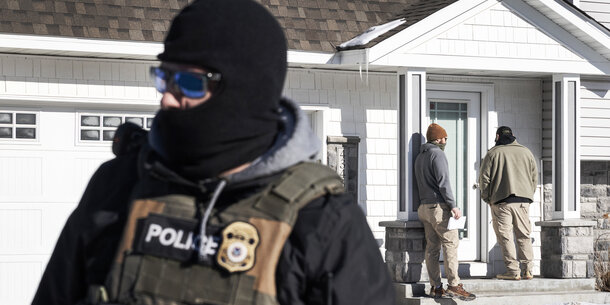This article first appeared at Bloomberg Law.
This week, the House will debate whether to reauthorize Section 702 of the Foreign Intelligence Surveillance Act, a controversial law that has been widely abused in recent years to spy on many Americans without a warrant.
But to some extent, the choice is illusory. The Biden administration just obtained permission from a special intelligence court to continue Section 702 surveillance until April 2025—even if Congress decides to let the authority lapse after it expires April 19 of this year.
The administration’s antidemocratic move to get around Congress dramatically underscores the need for lawmakers to rein in the government’s surveillance powers.
Section 702 is highly controversial—and for good reason. The law, enacted in 2008, allows the government to conduct warrantless surveillance for foreign intelligence purposes. Although targets must be non-US persons located outside the US, the surveillance inevitably sweeps in Americans’ communications in large volumes, for the simple reason that Americans frequently communicate with people overseas, some of whom are targets.
To protect the constitutional rights of those Americans, Congress included a provision in Section 702 directing the government to “minimize” the retention and use of their information. Despite this mandate, intelligence agencies routinely perform electronic searches of data collected under Section 702 for the express purpose of finding and reviewing Americans’ communications, sidestepping the Fourth Amendment’s warrant requirement.
The FBI conducted 200,000 of these “backdoor searches” in 2022 alone. Alarmingly, FBI agents have searched for the communications of tens of thousands of Americans engaged in “civil unrest”—including Black Lives Matter protesters—as well as members of Congress, journalists, and more than 19,000 donors to a congressional campaign.
Section 702 was scheduled to sunset in December 2023, and many lawmakers from both sides of the aisle had vowed not to renew it without major reforms to protect Americans’ privacy. With the deadline fast approaching, however, the administration pushed Congress to attach a “short-term” extension of the law—until April 19—to the defense authorization act. Surveillance hawks on the congressional intelligence committees supported the request.
At the time, pro-reform advocates pointed out that the extension was unnecessary. Section 702 surveillance operates pursuant to “certifications” submitted by the government and approved by the Foreign Intelligence Surveillance Court, a special court Congress created in 1978 to oversee foreign intelligence collection.
Those certifications typically last one year, and according to the government’s interpretation of the law, they remain in place until their scheduled expiration date even if the underlying law itself expires. Because the certification in place in December would not expire until April 12, there was no rush to renew Section 702.
As advocates warned, the requested four-month extension was likely a cover for a de facto 16-month extension. The April 19 deadline seemed carefully chosen to come after expiration of the certification then in place.
In the ordinary course of business, the administration would submit a new year-long certification in February or March, and the Foreign Intelligence Surveillance Court would approve it at some point before April 12. The government could then claim the right to continue surveillance into April 2025, even if Congress chose not to renew the law.
House and Senate intelligence committee members, however, insisted the extension was only a short-term measure, intended solely to buy Congress a few extra weeks to consider reauthorization. Administration officials, for their part, promised concerned lawmakers that they would not use the extension to seek a new certification extending beyond April 19.
Faced with these assurances—and with misleading claims that the government’s surveillance capacity would be dramatically curtailed upon expiration of Section 702—the Senate voted to keep the extension in the defense bill, and both chambers passed it.
The administration’s promises proved empty. Last month, officials asked the court to approve another year-long certification. On Friday, the administration told reporters that the court had granted its request.
Officials claimed the extension was necessary to avoid a lapse in collection between April 12, when the certification then in place was due to expire, and April 19, the deadline to reauthorize Section 702.
But that’s false. If the administration merely sought to avoid a 7-day gap in collection, it could have submitted a certification to cover just that gap. The law allows the government to submit certifications for “up to” a year—contemplating shorter-term certifications where appropriate.
There’s nothing illegal about the administration’s gambit, as officials will no doubt emphasize. But given widespread abuse of Section 702, clear concerns that members have expressed about the law, and representations made by administration officials and intelligence committee members in December, it was a shameful move nonetheless—one that shows contempt for the role of Congress and the democratic process more generally.
Congress must take back the reins. If it decides not to renew Section 702, it should enact legislation immediately terminating the certification approved by the court. And under no circumstances should it reauthorize Section 702 without major reforms to end the rampant abuses of the law—most importantly, a requirement that the government obtain a warrant before searching Section 702-acquired data for Americans’ communications.
The abuses of recent years show the government can’t be trusted with warrantless access to Americans’ Fourth Amendment-protected information. The administration’s evasion of Congress through its new one-year certification merely reinforces why Congress shouldn’t place its trust in the government to self-police.
Congress must enact strong safeguards the government can’t circumvent through backdoor searches, false promises, or strategic extensions.



